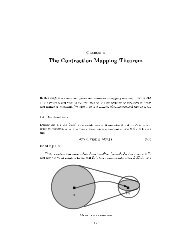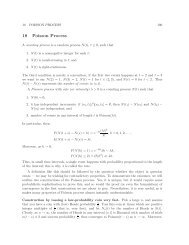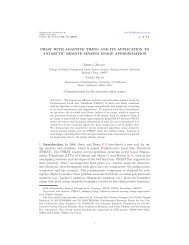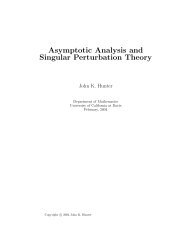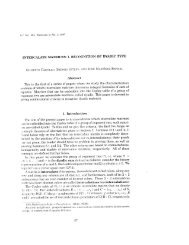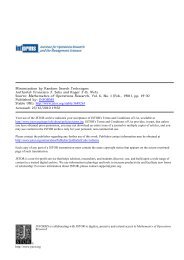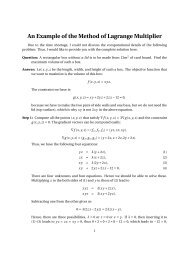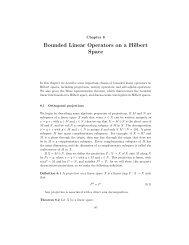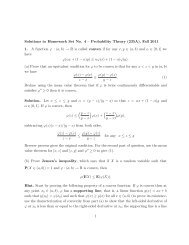The Riemann Integral
The Riemann Integral
The Riemann Integral
You also want an ePaper? Increase the reach of your titles
YUMPU automatically turns print PDFs into web optimized ePapers that Google loves.
8 1. <strong>The</strong> <strong>Riemann</strong> <strong>Integral</strong><br />
It follows that<br />
m∑ n∑ ∑q k n∑<br />
U(f;Q) = M l|J ′ l | = M l|J ′ l | ≤ M k |I k | = U(f;P)<br />
l=1 k=1l=p k k=1<br />
Similarly,<br />
∑q k<br />
∑q k<br />
m ′ l|J l | ≥ m k |J l | = m k |I k |,<br />
l=p k l=p k<br />
and<br />
n∑ ∑q k n∑<br />
L(f;Q) = m ′ l|J l | ≥ m k |I k | = L(f;P),<br />
k=1 l=p k k=1<br />
which proves the result.<br />
□<br />
It follows from this theorem that all lower sums are less than or equal to all<br />
upper sums, not just the lower and upper sums associated with the same partition.<br />
Proposition 1.12. If f : [a,b] → R is bounded and P, Q are partitions of [a,b],<br />
then<br />
L(f;P) ≤ U(f;Q).<br />
Proof. Let R be a common refinement of P and Q. <strong>The</strong>n, by <strong>The</strong>orem 1.11,<br />
L(f;P) ≤ L(f;R), U(f;R) ≤ U(f;Q).<br />
It follows that<br />
L(f;P) ≤ L(f;R) ≤ U(f;R) ≤ U(f;Q).<br />
□<br />
An immediate consequence of this result is that the lower integral is always less<br />
than or equal to the upper integral.<br />
Proposition 1.13. If f : [a,b] → R is bounded, then<br />
Proof. Let<br />
A = {L(f;P) : P ∈ Π},<br />
L(f) ≤ U(f).<br />
B = {U(f;P) : P ∈ Π}.<br />
From Proposition 1.12, a ≤ b for every a ∈ A and b ∈ B, so Proposition 2.9 implies<br />
that supA ≤ infB, or L(f) ≤ U(f).<br />
□<br />
1.4. <strong>The</strong> Cauchy criterion for integrability<br />
<strong>The</strong> following theorem gives a criterion for integrability that is analogous to the<br />
Cauchy condition for the convergence of a sequence.<br />
<strong>The</strong>orem 1.14. A bounded function f : [a,b] → R is <strong>Riemann</strong> integrable if and<br />
only if for every ǫ > 0 there exists a partition P of [a,b], which may depend on ǫ,<br />
such that<br />
U(f;P)−L(f;P) < ǫ.




